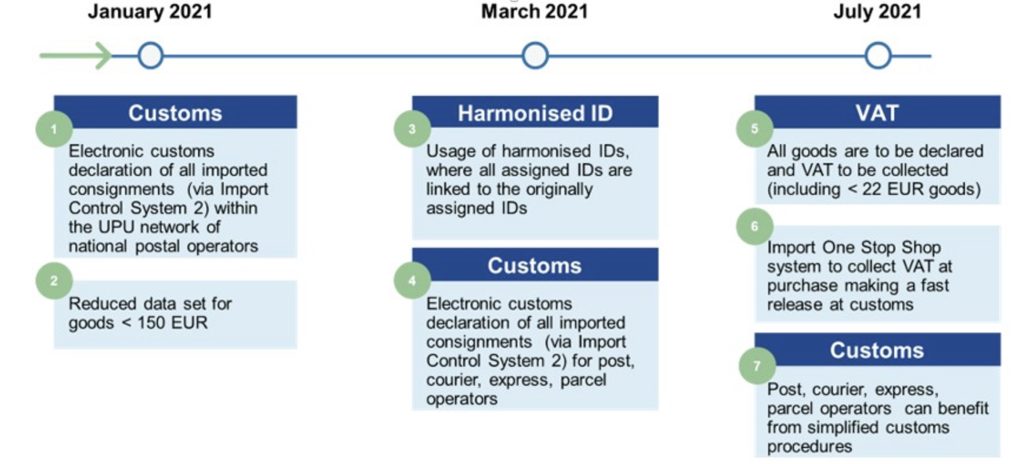

Businesses and customers are moving online to buy and sell goods and services, a trend accelerated and increasingly critical in the face of the COVID-19 pandemic. When businesses move online, they face two major challenges: the additional investments required to introduce goods online and lack of know-how and skills to operate online. At the same time, the EU is introducing the eCommerce VAT package in 2021, which changes eCommerce processes of which businesses and governments have limited awareness. In this new reality, the Eastern partner countries need support to move and adapt to electronic commerce.
Background of the EU4Digital eCommerce study
The EU, currently the second biggest cross-border buyer of goods, has established its own eCommerce rules, processes, know-how and ways of engaging stakeholders. Naturally, the member states expect these rules to be considered and followed by all their trading partners, including non-EU businesses. Otherwise, different rules create various obstacles and barriers that complicate eCommerce transactions.
To avoid such complications, there is a need to harmonise the digital environments between the Eastern partner countries and the EU. This includes harmonisation of the eCommerce ecosystem and approximation to relevant EU legislation and standards. For this reason, EU4Digital developed the baseline and recommendations to provide guidance to harmonise eCommerce among the Eastern partner countries and the EU in three areas: ecosystem, legal framework and standards.
The next step – launch pilot to increase eCommerce flows
During the state-of-play assessment in the Eastern partner countries, EU4Digital identified the following challenges for cross-border eCommerce trade:
- Major marketplaces operating in the EU are available in the Eastern partner countries but not commonly used for reasons such as lack of awareness and high cost to enter the EU market.
- Local marketplaces selling cross-border in the Eastern partner countries are not common and not personalised for EU customers.
- Average delivery time for cross-border sales is longer in the Eastern partner countries than in the EU.
These reasons have prompted EU4Digital to look for a possible solution that would strengthen eCommerce ecosystem and increase eCommerce volumes. One of the developed recommendations during the eCommerce activity was selected to become a pilot solution to address the challenges. The pilot solution is to establish national virtual warehouses / databases of local goods to connect eCommerce actors so they can automatically exchange information about sales, customs and delivery (see figure below).

Figure 1: The eCommerce solution – virtual warehouse
The virtual warehouse will support retailers, marketplaces, delivery operators and customs while placing the products for sale abroad and completing cross-border delivery. In particular, the solution will have the following benefits:
- For retailers: cost and time efficiency. The businesses manage the inventory in real time on a single virtual warehouse that marketplaces themselves can use to place products for sales.
- Marketplaces: trust and growth. By allowing to list goods on the interfaces, the virtual warehouse serves as trustworthy and real time database that allows the marketplaces to grow a portfolio of products.
- Postal operators: timely delivery and quality. Once the sale happens, marketplaces notify the virtual warehouse through the application programming interface (API) so that the national post can initiate cross-border transportation procedures on time and deliver the goods within 72 hours.
- Controlling authorities: transparency/quality of products – database provides the baseline for the quality control of local products and listings.
An additional goal of the pilot activity is to prepare eCommerce actors in the Eastern partner countries for the 2021 eCommerce VAT package introduced in the EU. The pilot countries will learn more about the upcoming changes (see figure below) and will get support to prepare for the following changes:
- Mandatory electronic customs declaration;
- Available reduced customs data set to all parcel operators from July 2021;
- Harmonised ID linking all assigned IDs on a parcel to items stored inside.

Figure 2: Overview of the 2021 changes in eCommerce area
The eCommerce pilot activity started In January 2021 with a meeting with the pilot countries
Following the proposed eCommerce pilot idea, the European Commission has confirmed Armenia, Azerbaijan and Georgia as the pilot countries. The first working meeting between the pilot countries was organised after receiving the official confirmation letters from the pilot countries, confirming their willingness and readiness to participate. During the meeting, the EU4Digital eTrade team, together with leading expert Mr. Walter Trezek, have introduced:
- eCommerce activity, its timeline and expected results/outputs
- the pilot concept and scope
- benefits for participating parties
- timeline
What is next?
EU4Digital have started holding technical meetings with assigned working groups of each pilot country. The working groups include:
- Coordinating institution in the pilot country
- Owner of the virtual warehouse
- Online retailers
- National postal operator
- Customs authorities
During these meetings, the participants discuss requirements for the pilot implementation, the state of play with product listing and cross-border delivery in the Eastern partner countries.
To increase the volume of eCommerce between the Eastern countries and the EU, EU4Digital suggested Germany as the EU member state to list products from Eastern partner retailers on the German marketplace(s). EU4Digital is cooperating with the German association, which is a member of Ecommerce Europe and is supported by more than 30,000 German SMEs. As the scope of the pilot includes applying the EU standards for product listing in a virtual warehouse, once the pilot is completed, the solution can be adapted for cross-border eCommerce with other members of the EU and the Eastern partner countries, as well as up to 192 countries within the Universal Postal Union that use the same standards.
The completed pilot activity will result in two major outputs for the Eastern partner countries:
- Transfer of virtual warehouse that was used (developed) during the pilot activity.
- Recommendations for full scale solution (virtual warehouse) implementation in the Eastern partner countries to boost eCommerce among the partner countries and with the EU.
EU4Digital launches activities to harmonise eCommerce between EU and Eastern partner countries
- Armenia
- Azerbaijan
- Georgia
- eTrade

12/02/2024
Resilience and digital transformation: Ukrainian universities in times of war
The digital technologies that support research and education (R&E) have been facing wartime challenges in…
Read More
30/01/2024
Wine Diamond — future ambassador to Europe of centuries-long Georgian tradition
“I had a previous life.” This is how Tamar Abuladze, the founder of Georgian brand ‘Wine Diamond’, begins the…
Read More
15/08/2023
The personal touch: Ukrainian wood company polishes its eCommerce strategy
“Wood is the all-time best material for making goods,” says Volodymyr Popovych, founder of ‘LIGNO’ in Western…
Read More

12/02/2024
Resilience and digital transformation: Ukrainian universities in times of war
The digital technologies that support research and education (R&E) have been facing wartime challenges in…
Read More
30/01/2024
Wine Diamond — future ambassador to Europe of centuries-long Georgian tradition
“I had a previous life.” This is how Tamar Abuladze, the founder of Georgian brand ‘Wine Diamond’, begins the…
Read More
15/08/2023
The personal touch: Ukrainian wood company polishes its eCommerce strategy
“Wood is the all-time best material for making goods,” says Volodymyr Popovych, founder of ‘LIGNO’ in Western…
Read More


